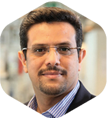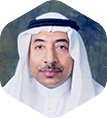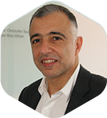Scientific committee
The team behind the first The Brain Forum came from a variety of scientific backgrounds, united by a common desire to bring an exciting vision to life.
Scientific organising committee

Dr. Jamil El-Imad
CEO, The Brain Forum, Switzerland
Dr. Jamil El-Imad

Dr. Jamil El-Imad is an Honorary Senior Research Fellow at the Institute of Biomedical Engineering at Imperial College London, a Fellow at the Institution of Engineering and Technology London, as well as the Managing Director and Chief Scientist of NeuroPro - a Swiss-based medical technology research, design and commercialisation company focused on bringing innovative, safe and low-cost solutions for applied neural signal analysis to the research and healthcare community.

Prof. Hilal Lashuel
Associate Professor, EPFL, Switzerland
Prof. Hilal Lashuel

Prof. A Lashuel received his BSc degree in Chemistry from the City University of New York, USA in 1994 and completed his doctoral studies at Texas A&M University and the Scripps Research Institute in 2000. After obtaining his doctoral degree, he became a Research Fellow at the Picower Institute for Medical Research in Long Island New York. In 2001, he moved to Harvard Medical School and the Brigham and Women's Hospital as a Research Fellow in the Center for Neurologic Diseases and was later promoted to an Instructor in Neurology at Harvard Medical School. During his tenure (2001-2004) at Harvard Medical School his work focused on understanding the mechanisms of protein misfolding and aggregation and the role of these processes in the pathogenesis of Parkinson's and Alzheimer's disease. In 2005 Prof. Lashuel moved to Switzerland to join the Brain Mind Institute at EPFL as a tenure-track Assistant Professor in Neurosciences. Currently, Prof. Lashuel is an Associate Professor of Life Sciences and the Director of the Laboratory of Molecular and Chemical Biology of neurodegeneration. He is also the Secretary General of the Society for Advancing Science and Technology in the Arab World. In 2009, he was named by the Hebdo magazine (Forum des 100) as one of the most outstanding personalities in the French region of Switzerland and was recently named Young Global Leader by the World Economic Forum.

Prof. Saeed Bohlega
Professor, King Faisal Specialist Hospital and Research Centre, Kingdom of Saudi Arabia
Prof. Saeed Bohlega

Prof. Saeed Bohlega, President of the Saudi Neurological Society, obtained his basic medical training at King Saud University, Saudia Arabia and graduated in 1980. In 1982, he went to Canada where he trainied in Neurology at University of British Columbia, Vancouver BC. He trained with Professor Don Paty. He developed a specialist interest in multiple sclerosis and he did subspecialty training in neurophysiology. In 1989, Prof. Bohlega joined the Department of Neurosciences at King Faisal Specialist Hospital and Research Centre as a Consultant Neurologist. He worked as a Consultant and then as a Senior Consultant and was appointed as Professor of Neurology at Al Faisal University, Saudia Arabia.
Prof. Bohlega is a member of many prestigious neurological societies like the American Neurological Association and the British Royal College of Physicians and Surgeons. He worked as a Section Head of Neurology then as a Chairman of the Department of Neurosciences. He is a Founder and Chairperson of the National Saudi Board of Neurology for ten years as well as the Chairman of the Saudi Multiple Sclerosis Advisory Group.He is also the President of the Saudi Neurology Society and the President Elect for the Pan Arab Union of Neurological Societies (PANUS). Prof. Bohlega has received numbers of national and international awards for his clinical and academic contributions. He has published more than 122 papers in a peer-reviewed journals, written book chapters, and has presented more than 180 presentations in various conferences.

Prof. Mohammed M.S. Jan
Professor, King Abdulaziz University, Kingdom of Saudi Arabia
Prof. Mohammed M.S. Jan

Prof. Mohammed MS Jan is a Professor and Consultant of Pediatric Neurology and Clinical Neurophysiology in the Department of Pediatrics, Faculty of Medicine, King Abdulaziz University (KAU), Saudi Arabia. He is also the Secretary General of the Saudi Epilepsy Society as well as the elected establishing member of the Saudi Pediatric Neurology Society, Vice President, Saudi Chapter of Epilepsy (member of the ILAE - 1997), Chairman of the Neurosciences Research Group Committee, KAU, Advisory Board Member, Neurosciences Journal External Referee, Grant proposals, KACST, Riyadh, Saudi Arabia. He has also been awarded four research publishing awards from the Deanship of Scientific Research, KAU, as well as four recognition awards from the Faculty of Medicine, KAU, a post-doctoral research award from the British Council, UK and multiple study grants. He has sat on conference committees, given international presentations and has 83 scientific publications in peer-reviewed journals and is the author of five books and book chapters.

Prof. Chris Toumazou
Director, Centre for Bio-Inspired Technology, Imperial College London, United Kingdom
Prof. Chris Toumazou

Prof. Chris Toumazou is currently the Founding Director and Chief Scientist at The Institute of Biomedical Engineering Imperial College London, UK, Founder and Executive Chairman of Toumaz Technology, Chairman and CEO of DNA Electronics, and Director of the Winston Wong Centre for Bio Inspired Technology. He has published over 700 research papers and holds 40 patents in the field of semiconductors and healthcare many of which are now fully granted PCT. Prof. Toumazou is distinguished for his ground breaking innovations in silicon technology and integrated circuit design. His career began with the invention and development of an entirely novel concept of current-mode analogue circuitry for ultra-low-power electronic devices. For this, at 33 years old, Prof. Toumazou became one of the youngest ever professors at Imperial College London. However, it has been his success in applying silicon chip technology to biomedical and life-science applications, most recently to DNA analysis, that is leading to new innovations in the field of genetics, molecular biology and personalised medicine.
Prof. Toumazou has received many awards including The Royal Society Clifford Patterson Prize Lecture, entitled "The Bionic Man", for which he received The Royal Society Clifford Patterson bronze medal in 2003; the IEEE CAS Education Award 2005 for pioneering contributions circuits and systems for biomedical applications; the Royal Academy of Engineering Silver Medal 2007 for pioneering contributions to British industry; and the IET Premium best paper award and the IEEE CAS outstanding young author award. In 2006 he was elected to Academia Europea.
Keep in touch
Subscribe for the latest announcements and events from The Brain Forum.




